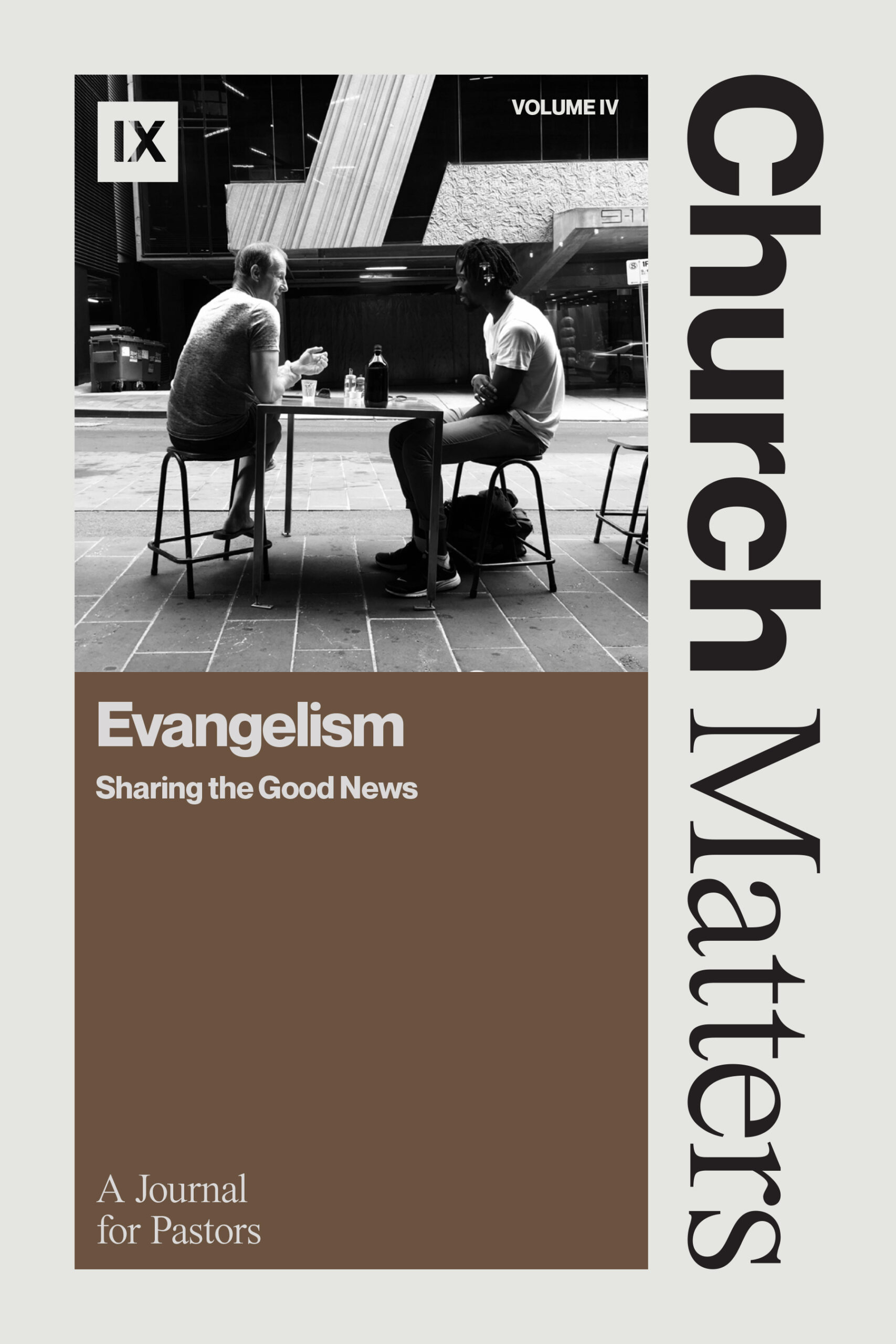How Spurgeon Got His Congregation
Many of you know the story of Charles Spurgeon. As a 19-year-old, he was called to pastor a historic congregation in London, and under his preaching, God brought about a remarkable revival. Throughout his 38-year ministry, Spurgeon regularly preached to a capacity crowd. By the time of his death, the membership at his church, the Metropolitan Tabernacle, was over 5,300.
But as gifted as Spurgeon was, it’d be wrong to think the thousands who joined his church were all converted through his evangelistic preaching. Instead, he gave credit to his congregation. As Spurgeon once shared at a gathering of Scottish ministers,
Somebody asked me how I got my congregation. I never got it at all. I did not think it my business to do so, but only to preach the gospel. Why, my congregation got my congregation.
The Testimony Books at the Tabernacle confirm Spurgeon’s words. In those documents, we read his elders’ records of thousands of conversion testimonies describing the ministry of ordinary members to bring the lost around them to faith. In those testimonies, exemplified in the stories that follow, we see at least five ways the church got Spurgeon his congregation.
Personal Evangelism
Spurgeon regularly reminded his people that evangelism isn’t just for pastors. Rather, all Christians—men, women, and children—are called to proclaim the gospel wherever the Lord places them. So many testimonies from the Metropolitan Tabernacle tell of the faithfulness of ordinary Christians to share the gospel. For example, in Ellen May’s testimony, the elder records,
Ellen attended a church of England Sunday School until three years ago when she became a domestic servant. Here she remained in nature’s darkness until nine months later when our sister Elizabeth Farrow entered the same household, thus becoming her fellow servant. It appears that our sister was not long there without trying to do something for the glory of Christ and the good of souls, for she was made the instrument in awakening this young girl to a sense of her lost estate.
For Benjamin Froud, the elder records,
Benjamin lives with Mrs. Christy and Company, hatters at Bermondsey. Mr. Oxford and Mr. Taylor, members with us, live in the same employ. Through the blessing of the Holy Spirit upon their instruction and warnings, this youth has been seriously impressed and awakened to a sense of his state as a lost sinner.
It’s worth noting these accounts because Farrow, Oxford, and Taylor weren’t Pastors’ College students or elders of the church. They were just faithful church members. And yet they were instructed in the gospel and were concerned “for the glory of Christ and the good of souls.” They were equipped and burdened to share Christ with those around them.
Church Invitations
For many at Spurgeon’s church, their conversion story starts with an invitation. For example, Alexander John Hamilton’s testimony begins with his older brother bringing him to the Tabernacle: “His brother (who has since become a member but is now in New Zealand) brought him to New Park Street one Sunday evening about three years ago, and there he found peace under the discourse.”
Of course, it’s not always that easy. There are stories where it took many invitations. James Boyce, in his testimony, tells how his sister kept inviting him to go to hear Spurgeon, but he always turned her down. Then on a Sunday night, on his way to a pub, he walked by the church. He thought about going in, but he decided he could reform his life on his own and went home. By the following Wednesday, he was back at the pub getting drunk, and conviction came over him about his utter failure to reform himself. That marked the beginning of his going to church, hearing the gospel, and being saved.
My favorite story is from Charles Sandell. One of his coworkers invited him to hear Spurgeon, so he went, and surprisingly, he enjoyed it. He attended regularly for about 12 months but didn’t experience any lasting change. Then the elder records,
He continued to attend without any apparent benefit, though he was frequently made to weep under the sermon. But during the absence of Mr. Spurgeon on the Continent, heard Mr. Radcliff . . . [who] was made the means of convincing him of sin. . . . After the service, he had some conversations with one of the elders, . . . and he was enabled to trust his soul on Jesus.
Sandell sat under Spurgeon’s preaching for a year! But in the end, God used a guest preacher and the work of an elder to bring him to conviction. I’m sure Spurgeon didn’t begrudge that one bit.
Sunday Conversations
The Metropolitan Tabernacle attracted all kinds of visitors each Sunday—people from out of town, people from the neighborhood, visiting relatives, and many others. But rather than making all the outreach dependent on the elders or the pastor, the congregation learned to welcome visitors and initiate meaningful conversations. As Spurgeon once said,
I always ask my own congregation to preach Christ in the pews. Get hold of the people who come there and tell them about Christ. I know people are a little starched up about the matter sometimes—a little mahogany comes between them and their fellows, but in the church there should be cordiality—the feeling that a man may venture to speak to his neighbor; to say, at least, “How did you enjoy the sermon?” to start the conversation, and detain him for a little while.
For many people who joined the church, this is where their testimony began. For example, here’s what happened to William Cartwright:
He came to hear our pastor last April and continued to do so several times without any profit. But on one occasion, our Brother Spanswick sought an opportunity of asking him whether he had ever thought of his soul’s salvation. He acknowledged he had not, and was urged to seek the Lord. He did so, and he soon discovered what a guilty sinner he was, and that God would be just in condemning him, but his only plea was the blood of Jesus.
Cartwright had listened to many sermons, but someone coming up to him and pressing home the issue of personal salvation made the difference.
Membership Interviews
During Spurgeon’s ministry, if someone wanted to respond to the gospel, the clearest way was by being baptized and joining the church. Any visitors who wanted to respond to the gospel were pointed to the membership process of the church. And the membership interview became an evangelistic ministry of the church’s elders.
In Spurgeon’s context and culture, there were all kinds of motivations for someone to join the church. The elders had the responsibility of examining each profession of faith. Those with a credible profession were joyfully affirmed. For any who were lacking, the elders had an opportunity to point them to the gospel.
This is what an elder wrote for James Melbourn’s membership interview:
This good man wishes to join the church because his wife has applied for membership. He has frequently heard Mr. Spurgeon and prefers his preaching to any he ever heard. I don’t think he has the faintest idea of the Gospel. I suppose he is sober, honest, industrious, and willing to join a church, or do anything else which is reputable and respectable. He reads parts of the Bible sometimes, and thinks it all very good, but knows no preference. . . . He does not recollect having ever particularly prayed to God for anything in his life.
I am astonished how any man could sit under our pastor’s ministry one Lord’s Day and be so entirely ignorant of his own ignorance of the Gospel. I spoke to him of the new birth and gave him a ticket for Brother Hank’s class.
In many ways, Melbourn sounds like an ideal candidate for membership. He came to church. His wife was joining, and he liked the preaching. He didn’t get drunk and he worked hard. Yet despite all that, he didn’t understand the gospel or give evidence of spiritual life. To assure him of his salvation by bringing him into membership could cause serious spiritual harm. So the elder here wisely sent him to “Brother Hank’s class,” where Melbourn could further study the Scriptures and learn the gospel.
Some testimonies talk about the applicant being turned away and the Lord using that experience to convict him or her of pride and sin. On one occasion, Harriet Olney applied for membership, and the elder interviewing her “was not satisfied with her testimony and could not recommend her.” Two years later, she reapplied for membership, and there the elder records,
Though much disappointed (initially), she now believes it to have been for the best as she has since then been more fully convinced of her sinfulness. I have seen her twice and although her knowledge of divine truth is by no means extensive, she knows she is a sinner. She believes that Jesus died for sinners and died for her.
To be clear, the elders didn’t require a high level of theological knowledge or fluency in these interviews. We see that in Olney’s testimony. Rather, what they were looking for was a credible profession of faith through a clear understanding of the gospel and evidence of repentance and faith. In this membership process, many applicants would come to understand the gospel for the first time and place their trust in Christ.
Classes for Seekers
In addition to the corporate gatherings of the church, the Tabernacle had all kinds of classes, many of them geared toward seekers. There were catechetical classes for young people, Bible classes for men, Bible classes for women, children’s Sunday schools, and much more. Each class had teachers with assigned rosters so the teachers felt a sense of responsibility for their classes and class members had responsibility for one another. Many of the testimonies trace their conversion back to these classes.
Elizabeth Polley grew up in the church. In her testimony, it was in the Sunday school where she was converted. The elder interviewing her wrote, “For the encouragement of the Sabbath School teachers, I would here mention how greatly the instruction of our sister Graves has been blessed to this young sister.”
Harriett Pitt grew up in church, but when she applied for membership, the elder decided “she had not a very clear view of the work of Christ for sinners.” So he sent her to a youth catechumen class. After some time in the class, she interviewed again, and the elder was happy to commend her.
For Emily Bingley, it was while attending a class that her teacher asked, “Emily, when will you give your heart to the Lord?” That question opened Bingley’s eyes to her condition and put her on the path to salvation.
Even though Spurgeon sought to preach the gospel in every sermon, these evangelistic Bible classes played an important role in personally engaging seekers with the gospel.
Power of Ordinary Outreach
How did Spurgeon get his church? Not as a lone ranger reaching the world with his preaching. Rather, the Metropolitan Tabernacle grew because of the evangelistic efforts of ordinary church members. This is the vision of Ephesians 4 where pastors are to “equip the saints for the work of ministry” (v. 12). It was the congregation that got Spurgeon’s congregation.
For those of us who are pastors, this should be a great encouragement. The task of evangelism doesn’t depend entirely on our efforts. Instead, as we equip our people to engage in personal evangelism, the gospel goes out in all kinds of different ways. And as church members are faithful in ordinary ways, we can pray for God to do extraordinary things.
* * * * *
Editor’s note: This article was originally published by TGC, republished with permission.









